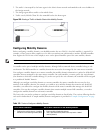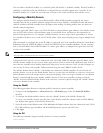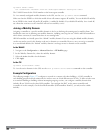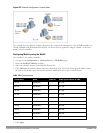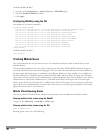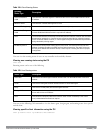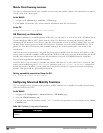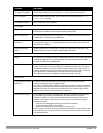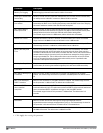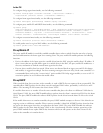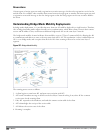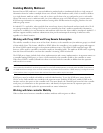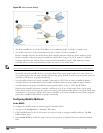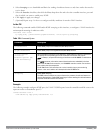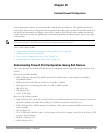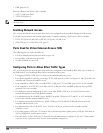
501 | IPMobility DellPowerConnectW-SeriesArubaOS6.2 | User Guide
Parameter Description
Mobility Trail Logging Enables logging at the notification level for mobile client moves.
Roaming for Authenticated
Stations Only
Allows a client to roam only if has been authenticated. If a client has not been authenticated,
no mobility service is offered if it roams to a different VLAN or controller.
Blocking DHCP Release
from stations
Determines whether DHCP release packets generated from the client should be dropped or
forwarded to the DHCP server. Blocking the packets prevents the DHCP server from assigning
the same IP address to another client until the lease has expired.
Max. Station Mobility
Events per Second
Maximum number of mobility events (events that can trigger mobility) handled per second.
Mobility events above this threshold are ignored. This helps to control frequent mobility state
changes when the client bounces back and forth on APs before settling down.
The allowed range of values is 1-65535 events, and the default value is 25 events.
Station Trail Timeout Specifies the maximum interval, in seconds, an inactive mobility trail is held. The allowed
range of values is 120-86400 seconds, and the default value is 3600 seconds.
Station Trail Max. Entries Specifies the maximum number of entries (client moves) stored in the user mobility trail. The
allowed range of values is 1-100 entries, and the default value is 30 entries.
Mobility Host Entry Hold
Time
Number of seconds the mobility state is retained after the loss of connectivity. This allows
authentication state and mobility information to be preserved on the home agent controller.
The default is 60 seconds but can be safely increased. Note that in many case a station state is
deleted without waiting for the stale timeout; user delete from management, foreign agent to
foreign agent handoff, etc. (This is different from the no-service-timeout; no-service-timeout
occurs up front while the stale-timeout begins when mobility service is provided but the
connection is disrupted for some reason.)
Mobility Host Entry Lifetime Time, in seconds, after which mobility service expires. If nothing has changed from the
previous state, the client is given another bridge entry but it will have limited connectivity.
Proxy DHCP
Max. BOOTP Messages per
Transaction
Maximum number of BOOTP packets that are allowed to be handled during one DHCP
session. The allowed range of values for tis parameter is 0-65534 packets. The default value is
25.
Max. Time Allowed per
DHCP Transaction
Maximum time allowed for a proxy DHCP session to complete. The allowed range of values
for this parameter is 1-600 seconds. The default value is 60 seconds.
Time to hold DHCP state
after transaction
completion
Hold time, in seconds, on proxy DHCP state after completion of DHCP transaction (DHCP ACK)
was forwarded to the client. This option ensures that late BOOTP replies reach the station and
that a retransmitted BOOTP request does not trigger a new proxy DHCP session.
The allowed range of values for this parameter is 1-600 seconds. The default value is 5
seconds.
Revocation
Retransmits Maximum number of times the home agent or foreign agent attempts mobile IP
registration/revocation message exchanges before giving up. The allowed range of values for
this parameter is 0-5 retransmissions. The default value is 3 retransmissions.
Interval Retransmission interval, in milliseconds. The allowed range of values for this parameter is
100-10000 milliseconds. The default value is 1000 milliseconds.
4. Click Apply after setting the parameter.



